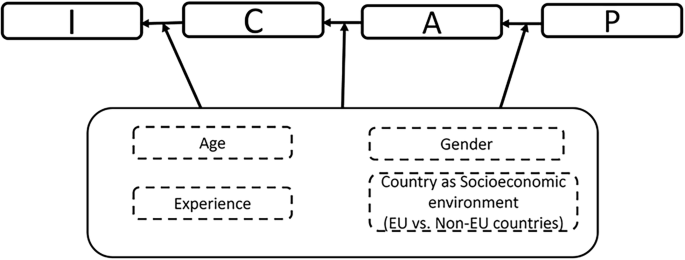Relations between teachers’ technology integration within ICAP modes with moderation effects: international perspective

Adebayo KA, Ntokozo N, Grace NZ (2020) Availability of educational resources and student academic performances in South Africa. Univers J Educ Res 8(8):3768–3781
Google Scholar
Anđić B, Maričić M, Weinhandl R, Mumcu F, Schmidthaler E, Lavicza Z (2024) Metaphorical evolution: A longitudinal study of secondary school teachers’ concepts of 3D modelling and printing in education. Educ Inf Technol 29(11):14091–14126. https://doi.org/10.1007/s10956-022-10005-0
Google Scholar
Anđić B, Ulbrich E, Dana-Picard T, Cvjetićanin S, Petrović F, Lavicza Z, Maričić M (2023) A phenomenography study of STEM teachers’ conceptions of using three-dimensional modeling and printing (3DMP) in teaching. J Sci Educ Technol 32(1):45–60
Google Scholar
Antonietti C, Schmitz ML, Consoli T, Cattaneo A, Gonon P, Petko D (2023) Development and validation of the ICAP Technology Scale to measure how teachers integrate technology into learning activities. Comput Educ 192:104648
Google Scholar
Ayanwale MA, Adelana OP, Odufuwa TT (2024) Exploring STEAM teachers’ trust in AI-based educational technologies: A structural equation modelling approach. Discov Educ 3:1–22
Google Scholar
Berman JJ (2016) Data simplification. Elsevier. https://doi.org/10.1016/C2015-0-00783-3
Bosch C, Laubscher DJ (2019) Cooperative learning as a strategy for self-directed learning in blended-distance learning environments: A systematic literature review. Student support toward self-directed learning in open and distributed environments 1–25
Branko A, Šorgo A, Helm C, Weinhandl R, Lang V (2023) Exploring factors affecting elementary school teachers’ adoption of 3D printers in teaching. TechTrends 67(6):990–1006. https://doi.org/10.1007/s11528-023-00909-y
Google Scholar
Buhari B, Sari RM (2022) Development of laboratory skills application based on android as a media of flipped learning model for nursing student. Malays J Nurs 14:30–35
Google Scholar
Byrne BM (2013) Structural equation modeling with Mplus: Basic concepts, applications, and programming (1st ed.). Routledge. https://doi.org/10.4324/9780203807644
Byrne BM (2016) Structural equation modeling with AMOS. Routledge. https://doi.org/10.4324/9781315757421
Cai Z, Fan X, Du J (2017) Gender and attitudes toward technology use: A meta-analysis. Comput Educ 105:1–13
Google Scholar
Cheung AC, Slavin RE (2011) The effectiveness of education technology for enhancing reading achievement: a meta-analysis. Center for Research and Reform in Education
Chi MT (2009) Active-constructive-interactive: a conceptual framework for differentiating learning activities. Top Cogn Sci 1:73–105
Google Scholar
Chi MT, Boucher NS (2023) Applying the ICAP framework to improve classroom learning. In: In their own words: What scholars want you to know about why and how to apply the science of learning in your academic setting. American Psychological Association, pp 94–110
Chi MT, Adams J, Bogusch EB, Bruchok C, Kang S, Lancaster M, Yaghmourian DL (2018) Translating the ICAP theory of cognitive engagement into practice. Cogn Sci 42:1777–1832
Google Scholar
Chi MT, Wylie R (2014) The ICAP framework: linking cognitive engagement to active learning outcomes. Educ Psychol 49:219–243
Google Scholar
Chi MTH, Roy M, Hausmann RGM (2008) Observing tutoring collaboratively: Insights about tutoring effectiveness from vicarious learning. Cogn Sci 32:301–341
Google Scholar
Chien YT, Chang YH, Chang CY (2016) Do we click in the right way? A meta-analytic review of clicker-integrated instruction. Educ Res Rev 17:1–18
Google Scholar
Cohen L, Manion L, Morrison K (2002) Research methods in education. Routledge
Consoli T, Désiron J, Cattaneo A (2023) What is “technology integration” and how is it measured in K-12 education? A systematic review of survey instruments from 2010 to 2021. Comput Educ 10:42–47
Coppe T, Parmentier M, Kelchtermans G, Raemdonck I, März V, Colognesi S (2024) Beyond traditional narratives about teacher professional development: A critical perspective on teachers’ working life. Teach Teach Educ 139:104436
Google Scholar
Cussó-Calabuig R, Farran XC, Bosch-Capblanch X (2018) Effects of intensive use of computers in secondary school on gender differences in attitudes towards ICT: A systematic review. Educ Inf Technol 23:2111–2139
Google Scholar
Dunn TJ, Baguley T, Brunsden V (2014) From alpha to omega: A practical solution to the pervasive problem of internal consistency estimation. Br J Psychol 105:399–412. https://doi.org/10.1111/bjop.12046
Google Scholar
Eros J (2011) The career cycle and the second stage of teaching: Implications for policy and professional development. Arts Educ Policy Rev 112:65–70
Google Scholar
Fütterer T, Hoch E, Lachner A, Scheiter K, Stürmer K (2023) High-quality digital distance teaching during COVID-19 school closures: Does familiarity with technology matter? Comput Educ 199:47–68
Google Scholar
Fütterer T, Scheiter K, Cheng X, Stürmer K (2022) Quality beats frequency? Investigating students’ effort in learning when introducing technology in classrooms. Contemp Educ Psychol 69:102042
Google Scholar
Giacomo DD, Ranieri J, Lacasa P (2017) Digital learning as enhanced learning processing? Cognitive evidence for new insight of smart learning. Front Psychol 8:13–29
Google Scholar
Gobert JD, Baker RS, Wixon MB (2015) Operationalizing and detecting disengagement within online science microworlds. Educ Psychol 50:43–57
Google Scholar
Grimley M (2012) Digital leisure-time activities, cognition, learning behaviour and information literacy: what are our children learning? E-Learn Digit Media 9:13–28
Google Scholar
Gui Y, Cai Z, Yang Y, Kong L, Fan X, Tai RH (2023) Effectiveness of digital educational game and game design in STEM learning: A meta-analytic review. Int J STEM Educ 10:1
Google Scholar
Hair JF, Black WC, Babin BJ, Anderson RE (2010) Multivariate data analysis: A global perspective. 7th edn. Upper Saddle River, NJ: Prentice Hall
Hillmayr D, Ziernwald L, Reinhold F, Hofer SI, Reiss KM (2020) The potential of digital tools to enhance mathematics and science learning in secondary schools: A context-specific meta-analysis. Comput Educ 153:103897
Google Scholar
International Telecommunication Union (2023) Measuring digital development: Facts and figures 2023. https://www.itu.int/itu-d/reports/statistics/facts-figures-2023/
International Telecommunication Union (2024) Measuring digital development: Facts and figures 2024. A (2006) The impact of institutional size on student engagement. NASPA J 43:87–114
Kock N (2014) Advanced mediating effects tests, multi-group analyses, and measurement model assessments in PLS-based SEM. Int J E-Collab 10:1–13
Kümmel E et al. (2020) Digital learning environments in higher education: a literature review of the role of individual vs. social settings for measuring learning outcomes. Educ Sci 10:78
Google Scholar
Ma W, Adesope OO, Nesbit JC, Liu Q (2014) Intelligent tutoring systems and learning outcomes: a meta-analysis. J Educ Psychol 106:901–901
Google Scholar
Maričić, M., Anđić, B., Mumcu, F., Rokos, L., Vondruška, J., Weinhandl, R., … & Špernjak, A. (2024) Evaluating the quality of technology integration across seven European countries with the ICAP Technology Scale. Journal of Computers in Education, 1-38. https://doi.org/10.1007/s40692-024-00341-y
Maričić M, Anđić B, Soeharto S, Mumcu F, Cvjetićanin S, Lavicza Z (2025) The exploration of continuous teaching intention in emerging-technology environments through perceived cognitive load, usability, and teacher’s attitudes. Educ Inf Technol 30(7):9341–9370. https://doi.org/10.1007/s10639-024-13141-9
Google Scholar
Maričić M, Cvjetićanin S, Anđić B, Marić M, Petojević A (2023) Using instructive simulations to teach young students simple science concepts: Evidence from electricity content. J Res Technol Educ 56(6):691–710. https://doi.org/10.1080/15391523.2023.2196460
Google Scholar
Muthén B, Muthén L (2018) Mplus user’s guide and diagrammer documentation. The Comprehensive Modelling Program for Applied Researchers: User’s Guide, 5
Ninković S, Florić OK, Momčilović M (2023) Multilevel analysis of the effects of principal support and innovative school climate on the integration of technology in learning activities. Comput Educ 202:104833
Google Scholar
Oliveira A, Feyzi Behnagh R, Ni L, Mohsinah AA, Burgess KJ, Guo L (2019) Emerging technologies as pedagogical tools for teaching and learning science: a literature review. Hum Behav Emerg Technol 1:149–16
Google Scholar
Praetorius AK, Klieme E, Herbert B, Pinger P (2018) Generic dimensions of teaching quality: The German framework of three basic dimensions. ZDM Math Educ 50:407–426
Google Scholar
Perera M, Aboal D (2019) The impact of a mathematics computer-assisted learning platform on students’ mathematics test scores. Maastricht Economic and Social Research Institute on Innovation and Technology (UNU-MERIT). https://www.merit.unu.edu/publications/wppdf/2019/wp2019-007.pdf
Ran H, Kim NJ, Secada WG (2022) A meta‐analysis on the effects of technology’s functions and roles on students’ mathematics achievement in K‐12 classrooms. J Comput Assist Learn 38:258–284
Google Scholar
Ritter LN (2017) Technology acceptance model of online learning management systems in higher education: a meta-analytic structural equation mode. l Int J Learn Manag Syst 5:1–16
Google Scholar
Sailer M, Stadler M, Schultz-Pernice F, Franke U, Schöffmann C, Paniotova V, Fischer F (2021) Technology-related teaching skills and attitudes: validation of a scenario-based self-assessment instrument for teachers. Comput Hum Behav 115:106635
Google Scholar
Schauble L, Glaser R, Duschl RA, Schulze S, John J (2009) Students’ understanding of the objectives and procedures of experimentation in the science classroom. J Learn Sci 4:131–166
Google Scholar
Scherer R, Siddiq F, Tondeur J (2019) The technology acceptance model (TAM): a meta-analytic structural equation modeling approach to explaining teachers’ adoption of digital technology in education. Comput Educ 128:13–35
Google Scholar
Scherer R, Teo T (2019) Unpacking teachers’ intentions to integrate technology: a meta-analysis. Educ Res Rev 27:90–109
Google Scholar
Schmitz ML, Antonietti C, Consoli T, Cattaneo A, Gonon P, Petko D (2023) Transformational leadership for technology integration in schools: Empowering teachers to use technology in a more demanding way. Comput Educ 204:1–15. https://doi.org/10.1016/j.compedu.2023.104880
Google Scholar
Schwartz DL, Chase CC, Oppezzo MA, Chin DB (2011) Practicing versus inventing with contrasting cases: the effects of telling first on learning and transfer. J Educ Psychol 103:759–775
Google Scholar
Stegmann K (2020) Effekte digitalen Lernens auf den Wissens- und Kompetenzenerwerb in der Schule: eine Integration metaanalytischer Befunde [Effects of digital learning for knowledge acquisition and competence development in school: an integration of meta-analytic evidence]. Z Padagogik 66:174–190
Sung YT, Chang KE, Liu TC (2016) The effects of integrating mobile devices with teaching and learning on students’ learning performance: a meta-analysis and research synthesis. Comput Educ 94:252–275
Google Scholar
Taber KS (2018) The use of Cronbach’s alpha when developing and reporting research instruments in science education. Res Sci Educ 48:1273–1296. https://doi.org/10.1007/s11165-016-9602-2
Google Scholar
Teng Z, Cai Y, Gao Y, Zhang X, Li X (2022) Factors affecting learners’ adoption of an educational metaverse platform: An empirical study based on an extended UTAUT model. Mob Inf Syst 2022(1):5479215
Torenbeek M, Peters V (2017) Explaining attrition and decreased effectiveness of experienced teachers: A research synthesis. Work 57:397–407. https://doi.org/10.3233/wor-172575
Google Scholar
Timotheou S, Miliou O, Dimitriadis Y, Sobrino SV, Giannoutsou N, Cachia R, Ioannou A (2023) Impacts of digital technologies on education and factors influencing schools’ digital capacity and transformation: a literature review. Educ Inf Technol 28:6695–6726
Google Scholar
Tolba EG, Youssef NH (2022) High school science teachers’ acceptance of using distance education in the light of UTAUT. Eurasia J Math Sci Technol Educ 18
Vogel F, Wecker C, Kollar I, Fischer F (2017) Socio-cognitive scaffolding with computer-supported collaboration scripts: a meta-analysis. Educ Psychol Rev 29:477–511
Google Scholar
Wang J, Tigelaar DE, Zhou T, Admiraal W (2023) The effects of mobile technology usage on cognitive, affective, and behavioural learning outcomes in primary and secondary education: a systematic review with meta‐analysis. J Comput Assist Learn 39:301–328
Google Scholar
Wekerle C, Daumiller M, Kollar I (2022) Using digital technology to promote higher education learning: the importance of different learning activities and their relations to learning outcomes. J Res Technol Educ 54:1–17
Google Scholar
West DM (2012) Digital schools: how technology can transform education. Brookings Institution Press
Yang J, Tlili A, Huang R, Zhuang R, Bhagat KK (2021) Development and validation of a digital learning competence scale: a comprehensive review. Sustainability 13:5593
Google Scholar
Yaron D, Karabinos M, Lange D, Greeno JG, Leinhardt G (2010) The ChemCollective – virtual labs for introductory chemistry courses. Science 328:584–58
Google Scholar
Zheng B, Warschauer M, Lin CH, Chang C (2016) Learning in one-to-one laptop environments: a meta-analysis and research synthesis. Rev Educ Res 86:1052–1084
Google Scholar
link





